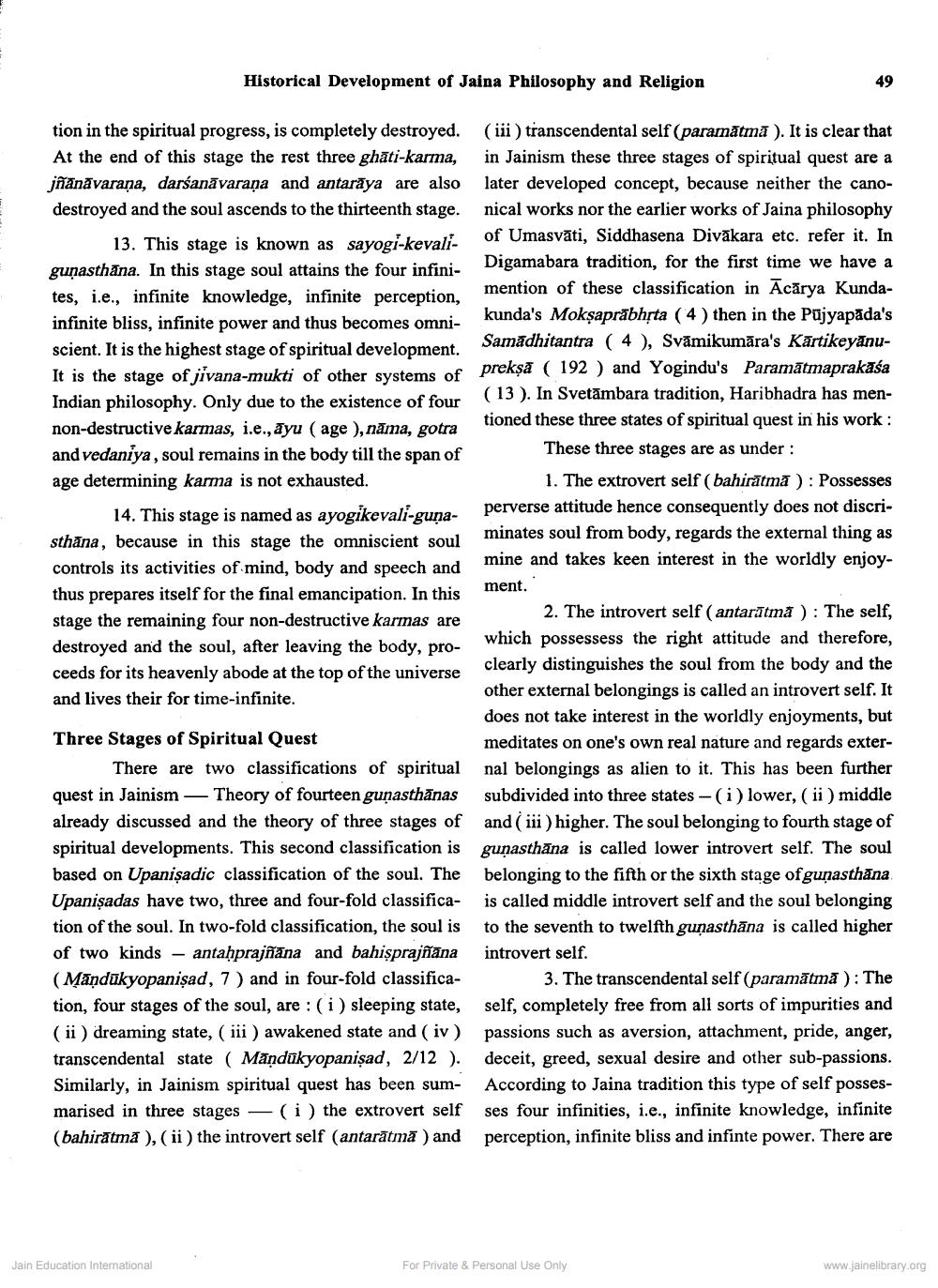________________
Historical Development of Jaina Philosophy and Religion
tion in the spiritual progress, is completely destroyed. (iii) transcendental self (paramātmā ). It is clear that At the end of this stage the rest three ghāti-karma, in Jainism these three stages of spiritual quest are a jñānāvarana, darsanāvaraņa and antarāya are also later developed concept, because neither the canodestroyed and the soul ascends to the thirteenth stage. nical works nor the earlier works of Jaina philosophy 13. This stage is known as sayogi-kevali
of Umasvāti, Siddhasena Divākara etc. refer it. In gunasthāna. In this stage soul attains the four infini
Digamabara tradition, for the first time we have a tes, i.e., infinite knowledge, infinite perception,
mention of these classification in Ācārya Kundainfinite bliss, infinite power and thus becomes omni
kunda's Mokşaprābhrta ( 4 ) then in the Pujyapada's scient. It is the highest stage of spiritual development.
Samādhitantra ( 4 ), Svāmikumāra's KārtikeyānuIt is the stage of jivana-mukti of other systems of prekșa ( 192 ) and yo
avstems of prekṣā ( 192 ) and Yogindu's Paramātmaprakāśa Indian philosophy. Only due to the existence of four (13). In Svetambara tradition, Haribhadra has mennon-destructive karmas, i.e., ayu ( age ), nāma, gotra
tioned these three states of spiritual quest in his work : and vedaniya, soul remains in the body till the span of
These three stages are as under: age determining karma is not exhausted.
1. The extrovert self (bahirātmā ) : Possesses 14. This stage is named as ayogikevali-guna
perverse attitude hence consequently does not discristhāna, because in this stage the omniscient soul
minates soul from body, regards the external thing as controls its activities of mind, body and speech and
mine and takes keen interest in the worldly enjoythus prepares itself for the final emancipation. In this
ment." stage the remaining four non-destructive karmas are
2. The introvert self (antarātma ): The self, destroyed and the soul, after leaving the body, pro
which possessess the right attitude and therefore, ceeds for its heavenly abode at the top of the universe
clearly distinguishes the soul from the body and the and lives their for time-infinite.
other external belongings is called an introvert self. It
does not take interest in the worldly enjoyments, but Three Stages of Spiritual Quest
meditates on one's own real nature and regards exterThere are two classifications of spiritual nal belongings as alien to it. This has been further quest in Jainism — Theory of fourteen guṇasthānas subdivided into three states -(i) lower, (ii) middle already discussed and the theory of three stages of and ( iii ) higher. The soul belonging to fourth stage of spiritual developments. This second classification is gunasthāna is called lower introvert self. The soul based on Upanişadic classification of the soul. The belonging to the fifth or the sixth stage ofgunasthāna Upanişadas have two, three and four-fold classifica- is called middle introvert self and the soul belonging tion of the soul. In two-fold classification, the soul is to the seventh to twelfth gunasthāna is called higher of two kinds – antahprajñāna and bahisprajñana introvert self. (Māņdūkyopanişad, 7) and in four-fold classifica- 3. The transcendental self (paramātmā ): The tion, four stages of the soul, are : (i) sleeping state, self, completely free from all sorts of impurities and (ii) dreaming state, ( iii ) awakened state and (iv) passions such as aversion, attachment, pride, anger, transcendental state ( Māņdūkyopanişad, 2/12). deceit, greed, sexual desire and other sub-passions. Similarly, in Jainism spiritual quest has been sum- According to Jaina tradition this type of self possesmarised in three stages — (i) the extrovert self ses four infinities, i.e., infinite knowledge, infinite (bahirātmā ), (ii) the introvert self (antarātmā ) and perception, infinite bliss and infinte power. There are
Jain Education International
For Private & Personal Use Only
www.jainelibrary.org




